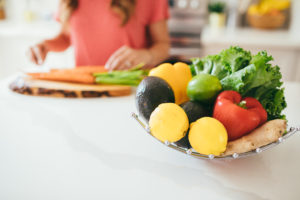During pregnancy and the days following delivery, there are so many changes happening quickly in our bodies. These rapid changes are incredible and fascinating. These changes can also leave us feeling like we’ve lost a sense of control within our own body.
Fortunately, we have some control over our diets, and this can dramatically impact our health in a positive way!
During pregnancy, the goal is to nourish the mother and her developing baby. The postpartum period is focused on replenishing the mother from nutrients lost during delivery and to encourage healing and recovery.
In general, we want to focus on eating real, whole foods in a variety of colours. Diversity in a diet is essential to obtain optimal levels of nutrients!

Here are some specific ways to support your body with food during your pregnancy and postpartum recovery.
Prenatal Nutrition Tips
- Reduce Nausea
- Vitamin B6 is a nutrient associated with preventing and reducing nausea.
- Foods that contain high levels of Vitamin B6 include: bananas, beans, salmon, eggs, dark leafy greens, poultry, green peas, avocados, oranges, papaya, cantaloupe, whole grains.
- Consume Essential Fatty Acids (EFAs) for Fetal Brain Development
- In addition to promoting healthy cognitive development in a baby, EFAs help to keep a pregnant woman’s mood and hormones balanced during pregnancy and postpartum.
- Consume oily fish such as salmon, sardines, herring and mackerel a few times a week.
- Consume sesame, pumpkin, flax and sunflower seeds daily. Aim for 1-2 tbsp of one seed or preferably a combination each day.
- Use cold-pressed oils for cooking when possible.
- Keep Bowels Moving
- The influx of the hormones relaxin and progesterone can cause the digestive system to slow down during pregnancy. The combination of these hormones and a growing baby putting pressure on the abdomen can lead to constipation.
- Increase fibre intake during pregnancy to keep the digestive tract moving regularly.
- Fibre-rich foods include: chia seeds, flax seeds, fruits (fresh and dried), vegetables, whole grains, lentils, beans.
- Don’t forget to drink plenty of water! Fibre needs to absorb water to bulk and soften stool, making it easier to pass.
- Consume Adequate Protein
- Amino acids are the building blocks of proteins and proteins are the building blocks of the body.
- The protein demand for a woman increase around 15% during pregnancy by the second trimester.
- High-quality sources of protein include: eggs, lean meats, grass-fed red meat, nuts, seeds, tofu, tempeh, lentils, beans, yogurt.
- Increase Iron Intake
- The blood volume doubles during pregnancy. Your body uses iron to make hemoglobin which transports oxygen throughout the body in the blood.
- Iron-rich foods include: organ meats (like beef liver), red meat, dark poultry (like chicken thighs), eggs, lentils, beans, dried fruits.
- Consume iron-rich foods with foods high in vitamin C to increase iron absorption and utilization.
Postpartum Nutrition Tips
- Continue Prenatal Multivitamin
- Continue taking your prenatal multivitamin for at least the first 3 months postpartum and up to 6 months postpartum if you are breastfeeding. This is a great way to ensure that you are getting a baseline of essential nutrients daily to support your body during the healing process, outside of your diet.
- Increase Collagen for Tissue Healing
- Bone broth is a very nourishing food that is loaded with collagen.
- Consume foods that are loaded with vitamin C to boost the natural production of collagen within your body.
- Vitamin C foods include: kiwi, bell peppers, broccoli, papaya, Brussels sprouts, strawberries, pineapple, oranges, cantaloupe, cauliflower.
- Vitamin-B foods for Energy
- The B family of vitamins play a large role in the production of energy in the body and they function optimally when they are all together.
- Any new mom can use as much energy as they can get!
- Foods high in B-vitamins include: mushrooms, cabbage, nuts and seeds, eggs, tomatoes, watercress, whole grains, alfalfa sprouts, cauliflower, broccoli, salmon, chicken, cottage cheese.
- Zinc for Mental Health
- Along with a few other key nutrients like B-vitamins and EFAs, a deficiency in the mineral zinc has been linked to developing postpartum depression.
- A lot of zinc is lost from the body during delivery, making it essential to replenish postpartum.
- Zinc containing foods include: oysters, pumpkin seeds, ginger root, lamb chops, pecans, shellfish, green peas, brazil nuts, haddock, whole grains, turnips.
 You’ll notice there are a lot of foods that overlap in various categories. Whole foods are loaded with a variety of vitamins and minerals that benefit the body in more ways than one. It doesn’t have to be complicated! The key is to include mostly real foods and to limit processed, packaged foods as much as possible – and don’t stress about the odd treat here and there either!
You’ll notice there are a lot of foods that overlap in various categories. Whole foods are loaded with a variety of vitamins and minerals that benefit the body in more ways than one. It doesn’t have to be complicated! The key is to include mostly real foods and to limit processed, packaged foods as much as possible – and don’t stress about the odd treat here and there either!
For more information on how you can help your body thrive, visit Bump Nutrition to explore our customized 12-week one-on-one nutrition programs!

💖